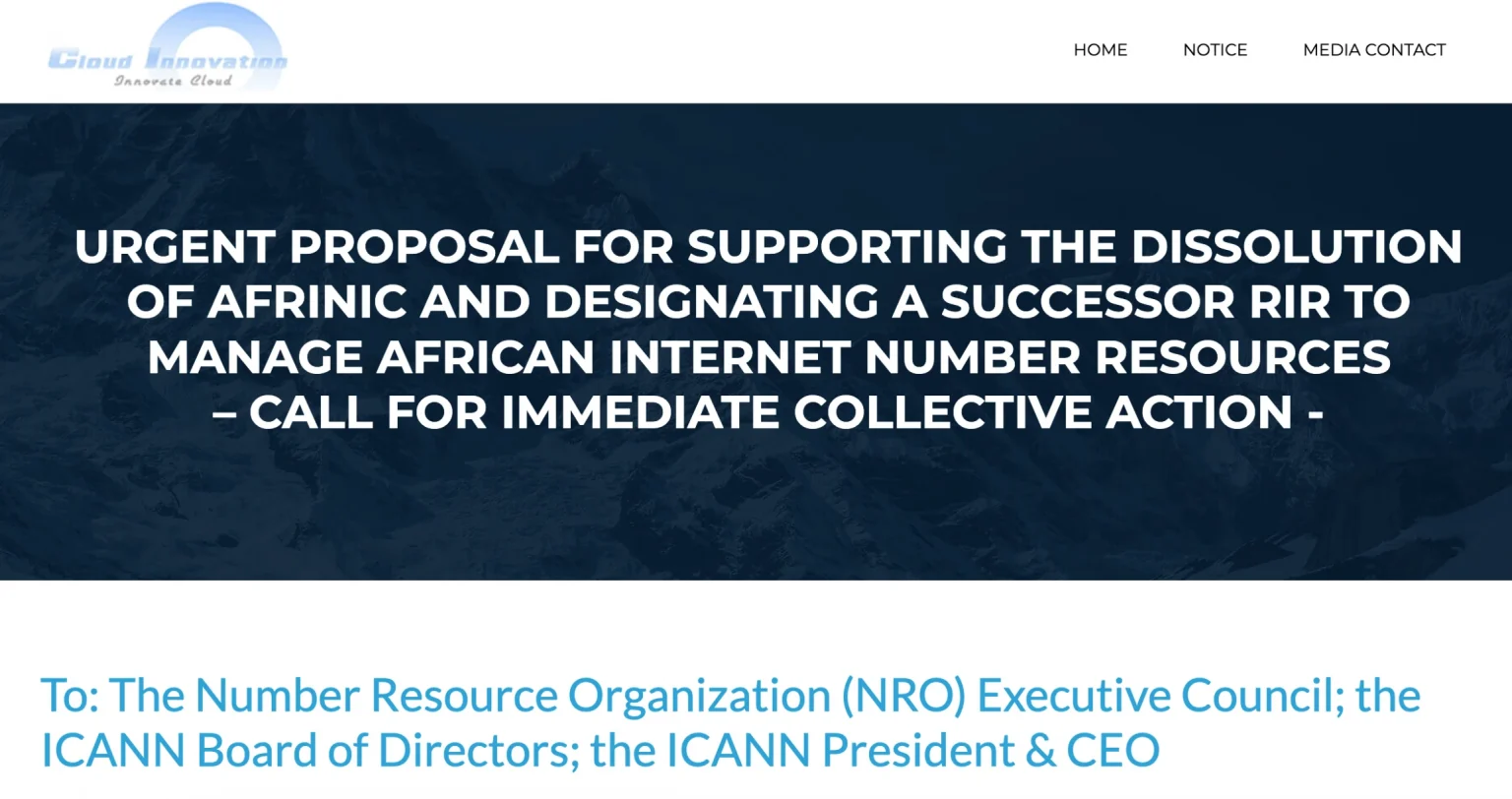- Cloud Innovation proposes urgent designation of a successor RIR under ICP-2 following AFRINIC’s annulled June 2025 board election.
- The company argues AFRINIC can no longer conduct credible elections and supports its dissolution via court proceedings set for 24 July.
In a dramatic escalation of its campaign against AFRINIC, Cloud Innovation Ltd. has formally proposed that a new Regional Internet Registry (RIR) successor must be designated without delay under the Internet Number Community Plan (ICP‑2). The proposal, titled “Immediate Designation of a Successor RIR under ICP‑2,” was published on Cloud Innovation’s website as part of its “Urgent Proposal for Supporting the Dissolution of AFRINIC”.
Cloud Innovation claims that AFRINIC’s governance is now irreparably broken. The proposal calls for the immediate replacement of AFRINIC following recent events that, in the company’s view, have made effective elections impossible. It notes that under ICP‑2, in an emergency or existential crisis, a clearly defined path to designate a successor RIR without delay is essential.
“Cloud Innovation shares ICANN’s assessment that the dysfunctions in AFRINIC’s system are fundamental and not fixable by simply rerunning elections,” it says.
“Cloud Innovation urgently calls on the NRO Executive Council and ICANN to invoke the ICP-2 process to designate a permanent successor Regional Internet Registry for the African region, as envisioned by the ICP-2 Implementation procedures for these circumstances.”
Cloud Innovation highlights that ICP‑2 explicitly anticipates circumstances in which an RIR is unable to fulfil its responsibilities, instructing that a successor must be designated “without unreasonable delay.” The company urges that Africa’s internet ecosystem cannot risk extended instability while legal battles drag on.
The implosion of AFRINIC’s June 2025 election
The call for an immediate successor follows a long history of friction between Cloud Innovation and AFRINIC, culminating in the failure of AFRINIC’s first court‑sanctioned board election held between 16–23 June 2025. Cloud Innovation and the NRS member advocacy group supported the election but expressed alarm at its collapse: “one disputed proxy” triggered a wholesale annulment, effectively “silencing hundreds of valid votes” they said.
Cloud Innovation pointed to the court-appointed Receiver’s decision to cancel the election after unverified proxy activity as proof that trusting election outcomes to AFRINIC is no longer viable. As they remarked, “if any one vote can be used to cancel an election, can AFRINIC ever hold a valid one again?”
Adding to the crisis, ICANN publicly warned on 25 June 2025 that the scandal had exposed “shocking allegations” casting doubt on AFRINIC’s legitimacy and even threatened to withdraw its global recognition if governance was not promptly reformed.
Cloud Innovation’s Africa agenda
Cloud Innovation has been deeply involved in AFRINIC’s governance saga for years. Since 2021 they have been entangled in legal disputes, initially from efforts to defend allocated IP resources, and later pushing for structural reform, including a push for Receiver‑supervised elections in 2025. Despite intervening in good faith to break the leadership vacuum, they concluded that AFRINIC’s operations remain in disarray.
As Cloud Innovation now argues, the combination of a now-unworkable election process, with the U-turn over a single contested proxy vote, and ICANN’s readiness to revoke recognition, has left no credible path forward. “A credible election has become impossible,” they state, ushering in the decision to formally support dissolution and transition to a successor RIR.
What comes next?
If Cloud Innovation’s petition is granted, AFRINIC would enter winding-up proceedings in the Supreme Court of Mauritius. Cloud Innovation has already filed for liquidation, with a court date scheduled for 24 July 2025.
Meanwhile, the clock is ticking for ICANN, the NRO, and the wider internet governance community to identify the successor framework that will best represent African stakeholders.
In pushing for swift action, Cloud Innovation’s proposal sends a clear message: time is of the essence. They argue that prolonged uncertainty around IP resources and governance gaps threaten the stability of the global internet numbering system.
Cloud Innovation’s track record
* Founded in 2013, the company has consistently championed transparency and rule of law within AFRINIC.
* It took the initiative to request a Receiver in 2023 to oversee overdue board elections and prevent misuse of its IP allocations.
* Despite significant legal investment, including litigation protecting its address blocks, Cloud Innovation had hoped the 2025 election could validate AFRINIC’s governance—but now sees dissolution as the only remaining path.
Cloud Innovation has urged ICANN and the NRO to move “without unreasonable delay” to select a successor RIR. This proposition is a defining moment. The African Internet community now faces a choice: continue amid a fractured, ungovernable AFRINIC, or rebuild from the ashes under a fresh, transparent, and globally‑supported regional registry.
As the clock runs down to the court hearing on 24 July 2025, stakeholders worldwide will be watching closely. The future of Africa’s internet numbering resources is at stake—and with it, the broader integrity of global internet governance.

